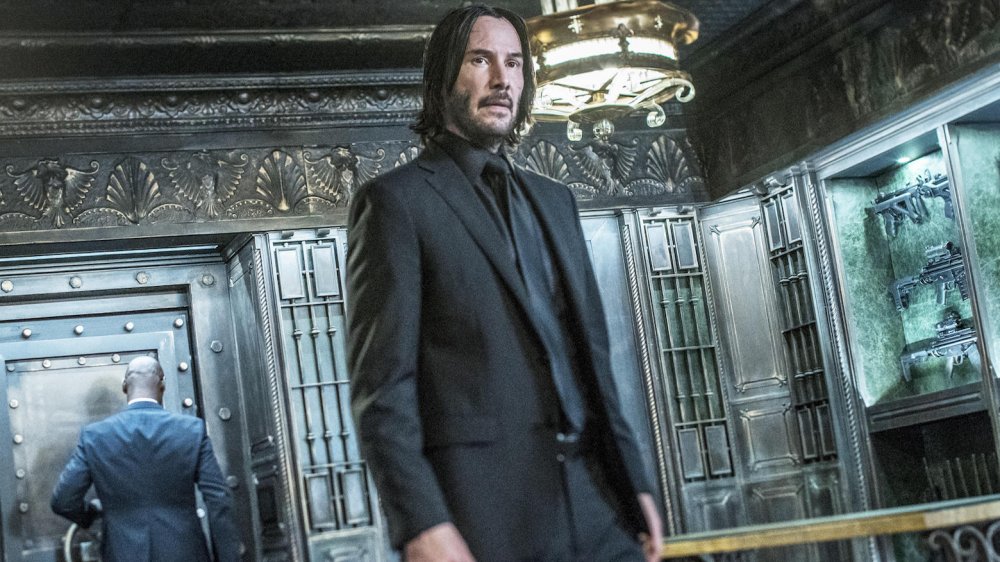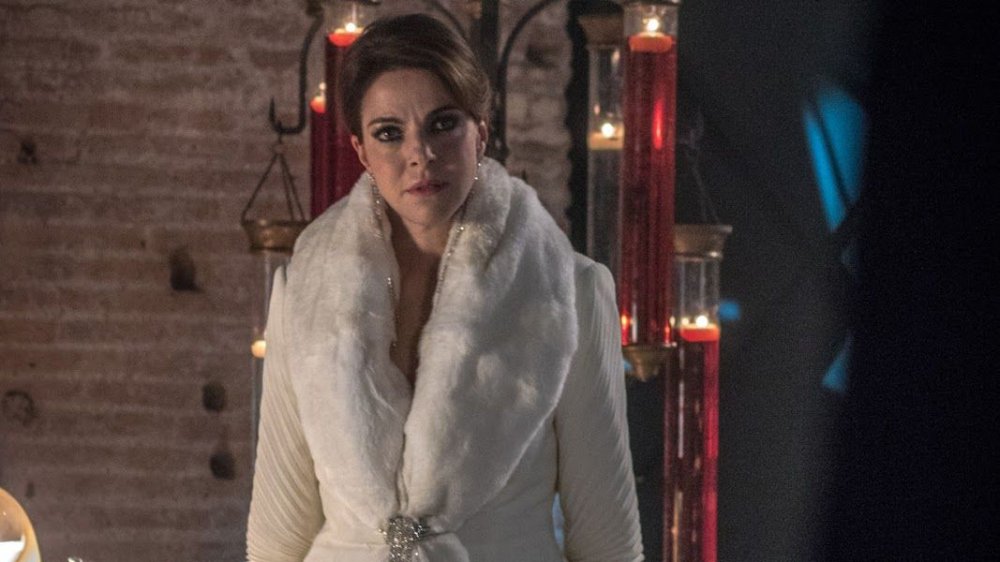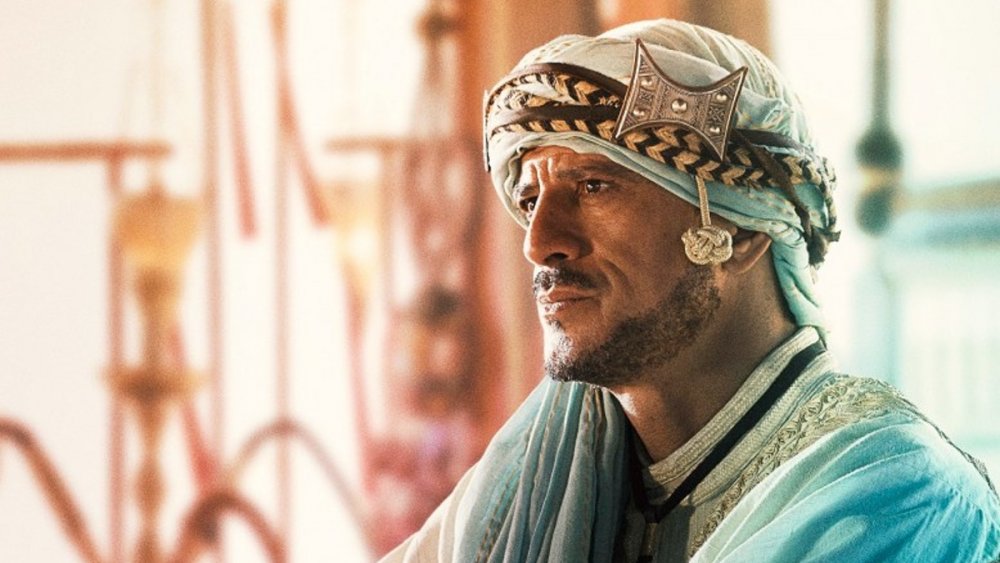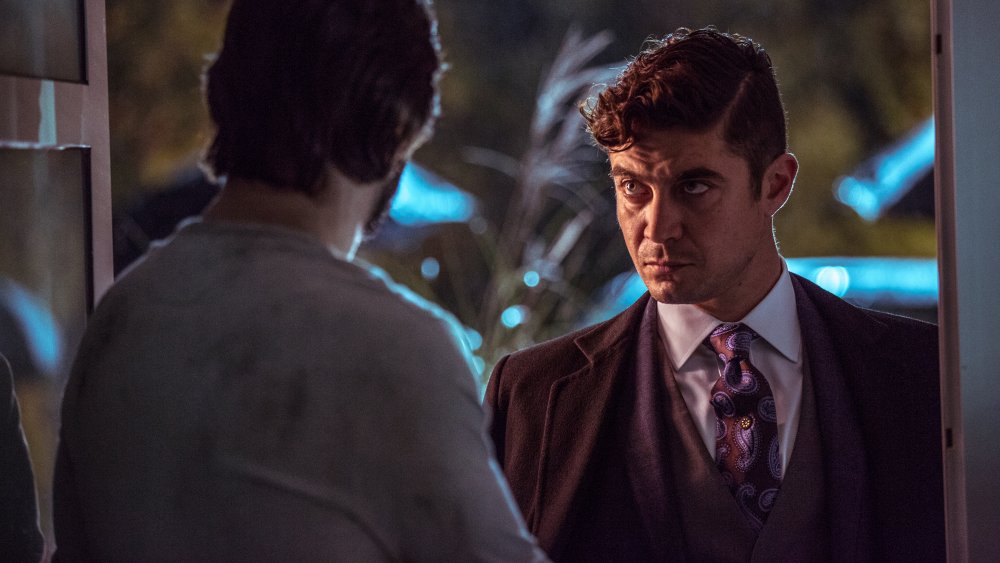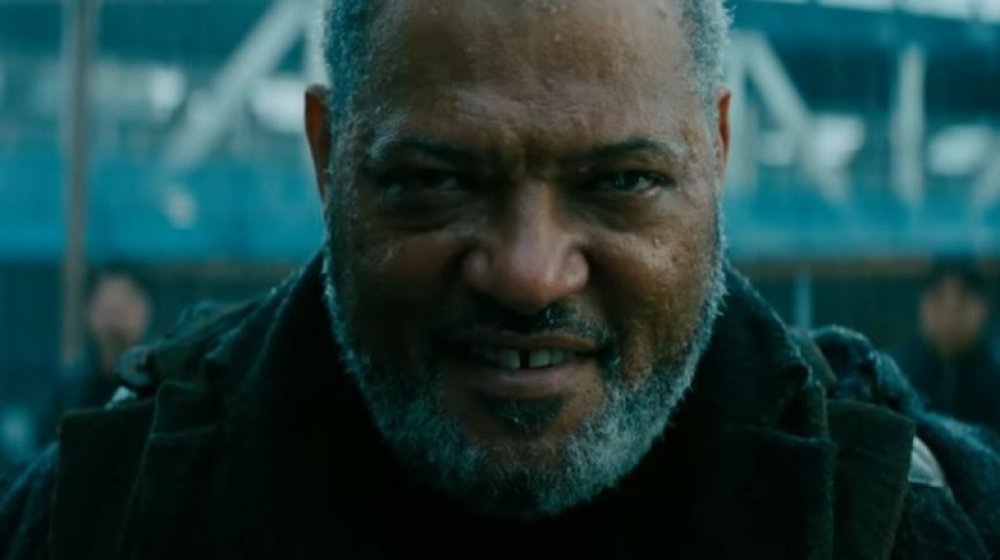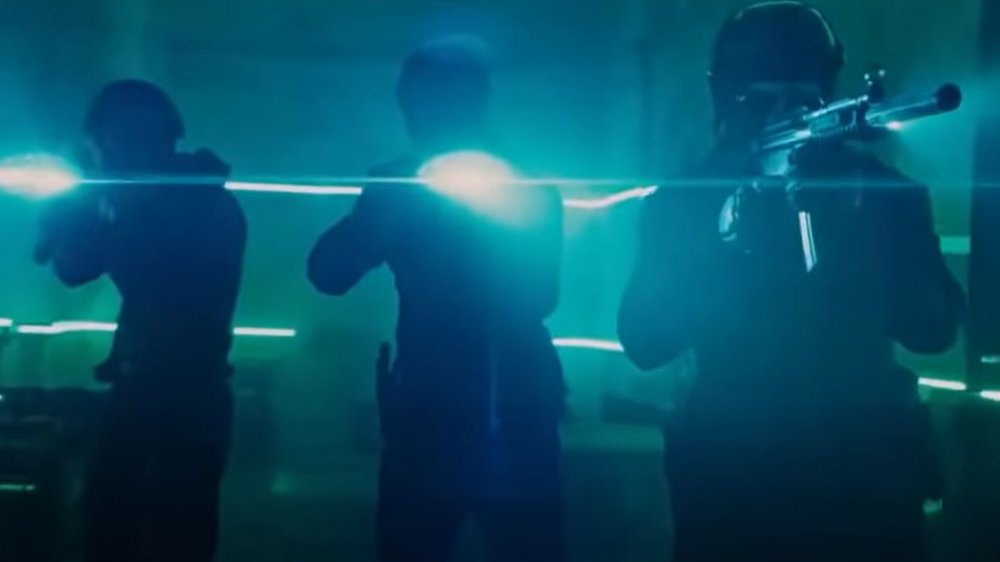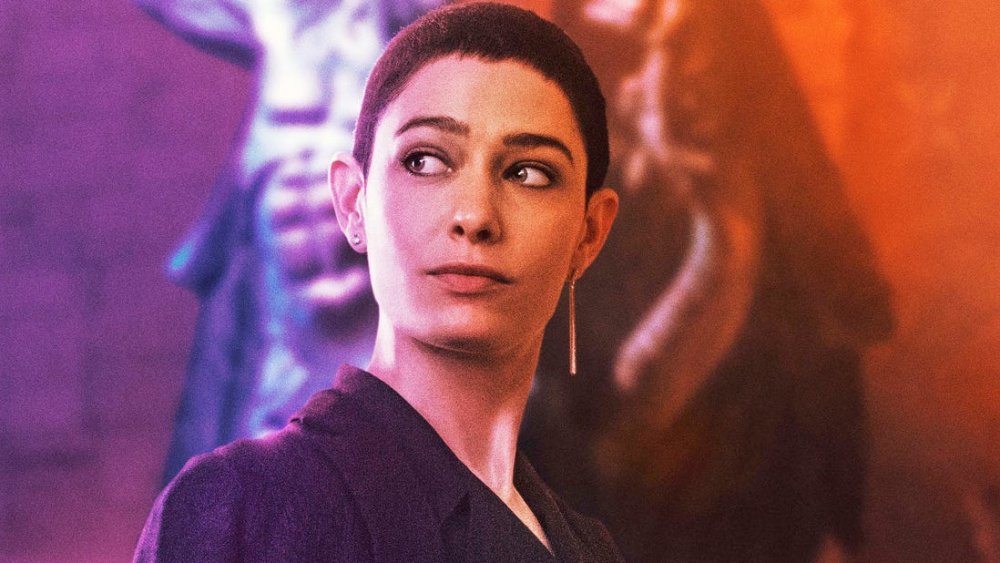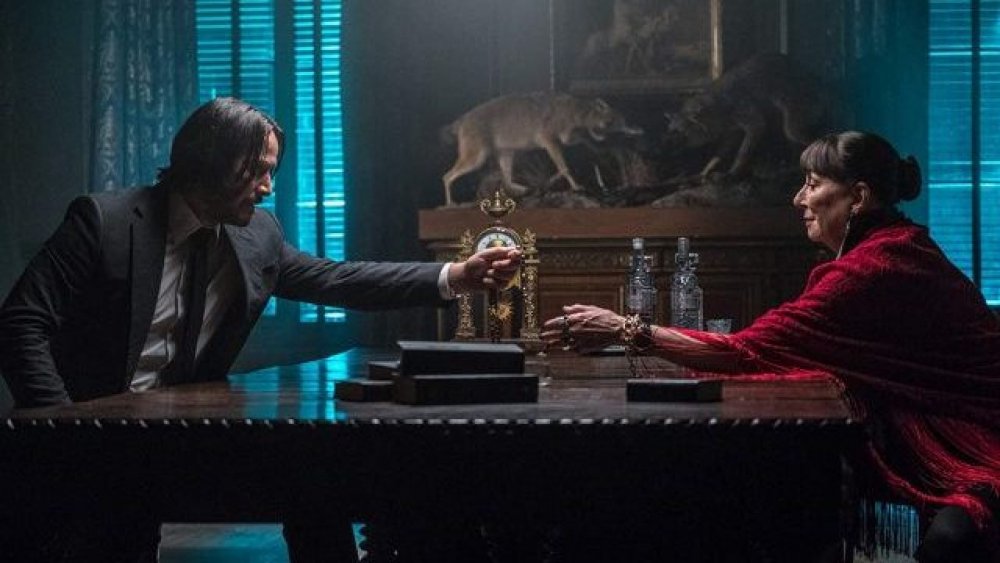The Untold Truth Of The High Table In John Wick
Those in the underground of the John Wick franchise swear an oath of fealty to the High Table, a council which functions as the leadership of the criminal world in the series. The High Table was introduced in John Wick: Chapter 2 as a way to explain why police officers would look the other way after seeing multiple dead bodies. Although it seems like numerous crime syndicates wouldn't dream of answering to a higher authority, the High Table is just that. It was likely created to regulate crime, with rules such as no killing in certain places (like the assassin-friendly hotel known as the Continental, for example), and to pull the resources of the underworld together in order to buy out law enforcement and politicians.
Not much is known about the High Table — it isn't mentioned in the first film, and Santino D'Antonio going after a High Table seat is as deep as its development goes in the second movie. The audience learns more about this shadowy group in John Wick Chapter 3: Parabellum, but it's still wrapped in layers of mystery (which will hopefully begin to unravel with the release of John Wick: Chapter 4). Despite the limited details, there are still nuggets of information which are key to understanding the true power the members of this organization wield. With that in mind, this is the untold truth of the High Table.
12 seats for 12 families
The High Table is made up of the leaders of 12 high-profile crime syndicates, which are led by "families" in the John Wick universe. Each organization is granted one seat at the table, and the head of each syndicate is typically the one to occupy that spot.
The only family with a seat on the Table that has appeared onscreen is the D'Antonio family in John Wick: Chapter 2. The remaining 11 members of the High Table are shrouded in mystery, although fans of the series have speculated that some of the seats are occupied by real-life underworld organizations such as the Yakuza, Triads, and the Russian mafia, and while some of these organizations certainly appear in the franchise, it is not yet certain whether any of their members actually hold seats at the Table. Like many details about the High Table that remain hidden from viewers for now, this mystery will hopefully begin to unravel itself in the fourth John Wick film.
There is one who sits above the High Table
Although the High Table is the ruling body of the underworld, there is a man whose own authority actually supersedes it. Known only as the Elder, he seems to reside in the Moroccan desert. While this allows the Table to run its affairs without much interference, the Elder does have the ability to stay up to date on the affairs of the world, given that he already knows of John Wick's plight when they meet in the third installment of the series. In John Wick: Chapter 3 – Parabellum, the Elder agrees to override the High Table's bounty and excommunication of Wick — that is, as long as he agrees to kill Winston, Wick's longtime associate and the owner of the Continental's New York location. The High Table's main enforcer, the Adjudicator, has been made aware of the Elder's deal and is sent to the Continental to witness the deed. This subtle move shows the power that the Elder wields, as well as the deference and respect the High Table gives him. While the Table is clearly powerful, the role of the Elder shows that even its ability to impose order has limits.
Blood will kill blood for a seat
Like the old sayings go: Be careful what you wish for, and heavy is the head that wears the crown. The truth of those statements is reflected in the pursuit of power on the High Table, because the immense power and prestige which comes with a seat also has a significant downside — specifically, even your own siblings are willing to kill you to claim it.
When the leader of the Camorra crime syndicate, which is run by the D'Antonios, passes away, he chooses his daughter Gianna to succeed him as both the leader of the Camorra and a member of the High Table. This leaves her brother Santino feeling snubbed, and his hunger for power eventually leads him to use a Marker to force John Wick to assassinate Gianna. After Wick kills the leader of the Camorra, Santino sends his men to silence Wick — and after Wick escapes, Santino puts a $7 million bounty on Wick's head to ensure his involvement in his sister's death is never revealed. Although Santino's power grab ends when Wick kills him in the Continental, his actions reveal the lengths some in the underworld will go to in order to gain power and recognition. Power obviously comes with its perks, but it also has significant drawbacks, and that's especially true at the High Table.
Not everyone follows the High Table willingly
While the High Table's reach covers almost the entire underworld, there's a strong component of self-interest driving everyone's actions here — otherwise, it wouldn't be much of an underworld — and there are some criminals who are powerful enough to visibly chafe under the group's control.
The Bowery King is perhaps the best example of someone who doesn't see eye to eye with the Table. As the leader of the Soup Kitchen, an intelligence network for assassins, the King supplies Wick with a firearm and some ammo while he's on the run from Santino D'Antonio. After Santino is killed by Wick, the Table decides to punish the Bowery King for his role in Santino's death, forcing him to do "penance" by enduring seven cuts from the Adjudicator's blade. He obliges and is left near death — just as Wick is toward the end of the third movie, when he's rescued by one of the King's men, and the Bowery King informs Wick he's engaging in open rebellion against the Table. Although the High Table's influence is undeniable, there are definitely some rebels who don't agree with the status quo — and aren't afraid to show it.
Bulletproof enforcers
Given that they serve as the ruling council for the underworld, it figures the members of the High Table would have access to the finest weaponry — and an army of mercenaries to wield it. With their advanced gear and armor impervious to regular bullets, the High Table's shock troops are perhaps the best expression of their power.
In the battle for the Continental, the High Table troops cut through the Continental's defenses. The average assassin stands absolutely no chance against the High Table's elite soldiers — John Wick's ridiculous skills and some armor-piercing slugs are ultimately the only reasons the Table's men aren't able to take the hotel during the assault. Moreover, one has to imagine that the threat of further aggression by High Table troops is on Winston's mind when he seemingly betrays Wick by shooting him off the roof of the Continental toward the end of Chapter 3. It's more than likely that fans of the series will see these elite mercenaries again, as John Wick is poised to join the Bowery King's war against the High Table in the fourth installment of the franchise. Through the sheer numbers and superior equipment of its elite soldiers, the High Table is able to enforce their will upon all who defy them — for now, anyway.
None stand above the Adjudicator
The Adjudicator is the name bestowed upon the High Table's primary enforcer. They have the power to determine the fate of anyone who crosses the organization — even members of the Table themselves. What this all means is that, with the exception of the Elder, the Adjudicator is arguably the most powerful person in the underworld's political system.
In John Wick: Chapter 3 – Parabellum, the Adjudicator uses their authority to press Zero's assassins into service in order to dole out punishment to Wick's allies for granting him aid in escaping New York. The Adjudicator's authority is further demonstrated in the battle for the Continental, when they "deconsecrate" the hotel, which allows for killing on its grounds. At the conclusion of the battle, they decide to spare Winston and reconsecrate the Hotel, indicating they possess a large degree of decision-making authority from the High Table. With broad power and the backing of the Table, the Adjudicator isn't someone a member of the Wick universe's underworld wants to mess with — either politically or in combat.
Everyone respects the power of the Table
Given the vast resources and political power the High Table wields, it's no surprise that almost everyone in the underworld fears or at least respects the group — including John Wick.
After Wick finds the Elder, he's offered a chance to have his sins against the Table washed away if he kills Winston. He definitely considers it, since Winston later has to convince Wick not to kill him and instead fight against the Table. Later, after the battle of the Continental is waged, Winston decides to pitch his rebellion as a "show of strength" to the Adjudicator, who lets him keep his power "under the Table." Wick's initial intention to kill Winston — and Winston's subsequent (seeming) betrayal of Wick — goes to show that even the most feared individuals in the underworld have some degree of respect for the power of the High Table. Will that still be the case after John Wick 4? We can't wait to find out.
